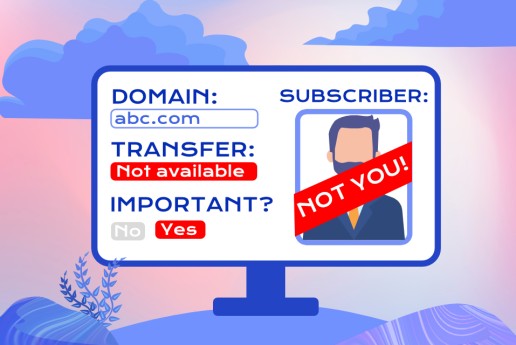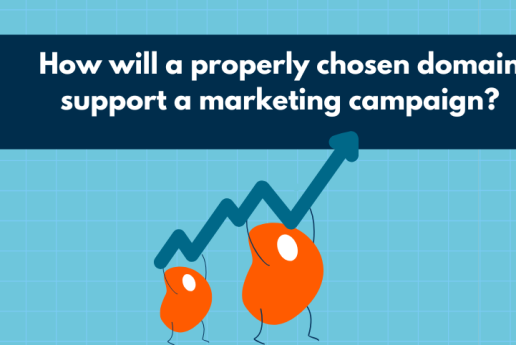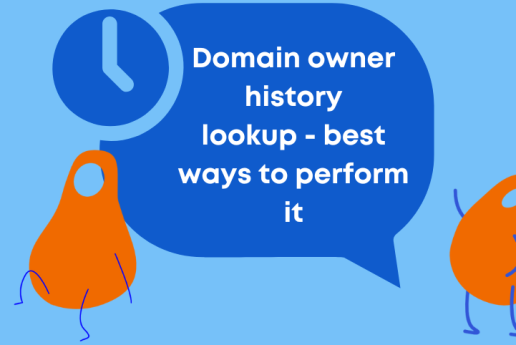Multiple websites - should you have them and how to manage them?
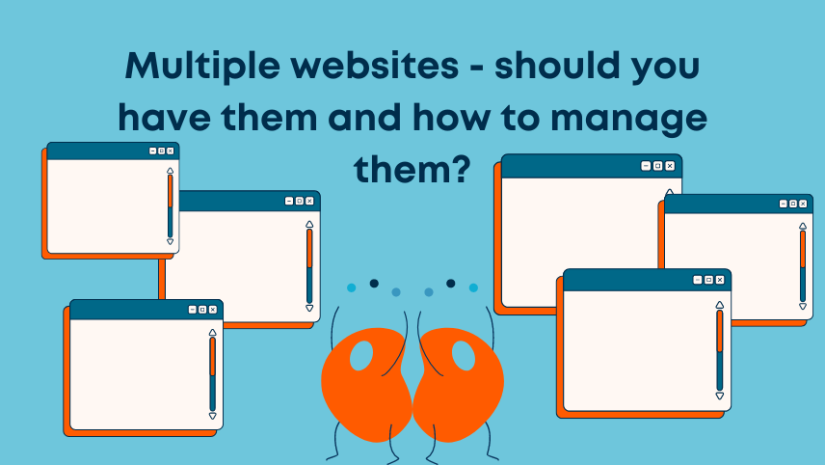
Multiple websites for one business - is it useful to have multiple domains to one site, and if so, how do you manage them effectively? In this article, we will explore the potential benefits and challenges of having multiple websites, exploring key strategies that can help you manage them effectively.
We will also address the issues associated with buying multiple domain names and compare the situation when a business has a single website vs. multiple websites and their advantages and disadvantages.
Single website vs. multiple websites - advantages and disadvantages
Before we get into why you should have multiple websites for one business, let's take a look at the single website vs. multiple websites situation. We will look at their advantages and disadvantages and help you make a decision. Determining how to manage a single website vs. multiple websites requires you to consider various factors, including your business goals, the resources available to your business, and the expectations and needs of your target audience.
Single website
The key advantages of a single website include easier content management, updates and security monitoring. This in turn is due to the concentration of all activities in one place. It also allows for easier maintenance of brand consistency, as all information is presented in one location. Additionally, the costs associated with maintaining a single website, such as hosting, development and SEO, are lower than when managing multiple sites. By focusing all efforts on a single website, search engine positioning can also benefit, as all external links point to the single website.
Choosing to remain a single website also involves certain constraints, especially in terms of catering to different target groups. It is a challenge to effectively serve different market segments, especially for companies offering a wide range of products or services. There is also a risk of overloading users with too much information aimed at different groups, which can lead to confusion and make the site difficult to navigate.

Multiple websites
Managing multiple websites makes it possible to accurately reach specific target groups. Having multiple websites for different market segments enables the creation of personalized messages and offers. Another benefit is the SEO optimization of each site for specific keywords, which increases search engine visibility for a variety of queries. In addition, having multiple sites makes it easier to test new business or marketing ideas without the risk of negatively impacting the company's main site, and provides flexibility and scalability to adapt to market changes.
Meanwhile, managing multiple sites requires more financial and human resources, which can be challenging. It can be harder to maintain consistency of branding and communication between different sites. Additionally, customers may feel confused if it is not clear how the different sites are linked to each other or which site offers specific products or services.
Single website vs. multiple websites - what to choose?
Choosing a single website versus multiple websites depends on several factors, including the scale of your business, your resources, your business objectives, and the preferences and behaviors of your target customer base. The key is to understand your business needs and your customers' expectations, and then choose the solution that best serves both your business's strategic objectives and provides an appropriate user experience and service. This choice should also take into account plans for business growth and scaling.
Multiple websites for one business - why do you need it?
Curious about the advantages of having multiple websites for one business? Take a look at the multiple domain strategy and what the potential benefits are of having multiple websites for your business.
Marketing: market segmentation, advertising activities, and product presentation
Does your company offer different ranges of products or services to different market segments? Or are you going abroad with your products? Having a dedicated website for each of your products significantly improves your reach to individual target groups. Your brand will present individual products more easily and plan tailored marketing activities.
With dedicated websites for specific markets in terms of language, marketing communications are more personalized and effective. Customers trust brands that reach out to them in their native language!
Buying multiple domain names will be useful when planning specific advertising activities. You may then buy a domain to set up an advertising campaign or to specify a particular product. As you can see, multiple domains to one site can work in many situations.

Search engine optimization (SEO)
Multiple websites for one business will allow you to focus on specific sets of keywords for each page, including the implementation of extended phrases, known as long-tail. This, in turn, increases your brand's chances of ranking better in search results for different queries. For brands operating in several different industries or offering a wide range of products or services, such an action will be very beneficial, as it will translate into increased sales in the long term.
Increase brand visibility and recognition
Owning more websites means more brand touchpoints, which increases the online visibility of your business. Each website is a new opportunity to reach potential customers. It also reinforces your brand presence in the minds of consumers. We hope this is an argument that will motivate you to have at least two websites or more.
Testing new ideas
Multiple websites for one business also provide the opportunity to experiment with different marketing approaches, website styling, product offerings and pricing strategies. All this without the risk of damaging your company's main website. It's also a space to innovate and optimize existing activities and look for new solutions. Keep in mind that multiple websites also mean two websites or more.
Point multiple domains to one website? Does it make sense?
When analysing the multiple-domain strategy, you might wonder whether to point multiple domains to one site. Multiple domains to one site can have many advantages. Pointing multiple domains to one website is a practice that makes sense in certain business and marketing situations, although it is always worth thinking carefully about the motivations and implications of doing so. What are the reasons for pointing multiple domains to one site? See:
-
Brand protection. Purchasing domains related to your company name, key products or services you offer will prevent them from being taken over by competitors or SPAM-generating sites.
-
Having different spellings of your brand name as domains and redirecting them to your main website can help users who make the mistake of typing the address into a browser.
-
For businesses operating globally, having local domains (e.g. .de, .fr, .es) redirected to the main site will improve local SEO and help build trust with an international audience.
Pointing multiple domains to one website will provide you with many benefits. Having multiple domains on one website is an effective tool to protect your brand, make your site more accessible or support a rich product offering. Ensure that this action does not harm SEO, content management or user trust.
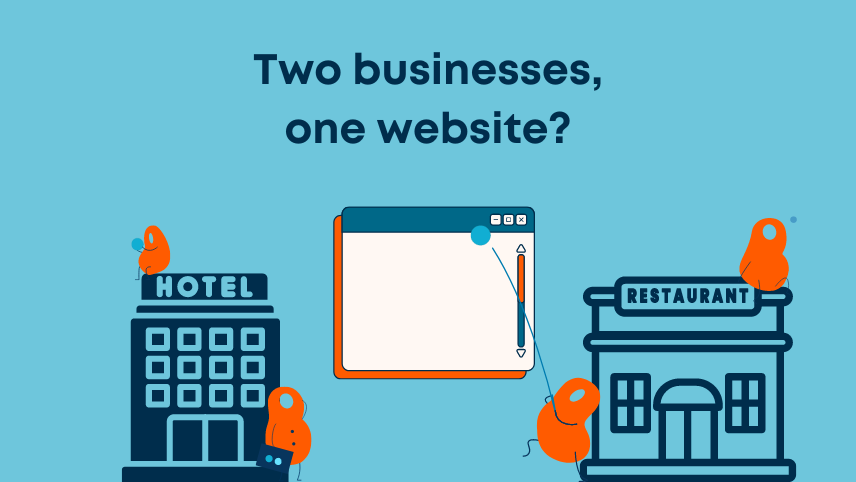
Two businesses, one website? Is this even possible?
Two businesses, one website? Having the offers of two businesses on one website is possible. However, this decision should be made after careful analysis and consideration of several important factors. These include:
-
matching of the offer,
-
image of both brands,
-
clear navigation and UX (user experience) of the website.
If two companies are closely related and offer complementary products or services, putting them together, on one page, can be very beneficial. It will make it easier for customers to find comprehensive solutions and save them time. The companies must interact with each other and offer added value to site visitors.
Think about how combining two companies on one site will affect the perception of each. In some cases, it may make the companies perceived as less professional or specialised.
Site navigation and layout should be developed so that visitors easily understand that the site represents two different companies. This may involve a clear division of sections, clear signage and the design of an intuitive UX (user experience) and UI (user interface) to avoid confusion and provide a positive experience for potential customers.
After considering these aspects, consider whether you want to have two businesses on one website or split into two websites. The final decision as to whether to leave two businesses on one website will have a significant impact on their performance.
Can multiple websites be located on one IP?
Shared hosting is where multiple websites can reside within one IP. This practice is prevalent among hosting providers who host multiple sites of different clients on a single physical server.
The advantage of hosting multiple websites in one IP on shared hosting is usually less expensive than dedicated hosting solutions, as server maintenance costs are shared between multiple users. Hosting providers frequently offer site management tools that make setting up and maintaining multiple sites easy for those without technical expertise. Hosting multiple websites in one IP is a practical and cost-effective solution for many scenarios, but requires awareness of potential performance, security and SEO limitations. Before you decide whether you want to host multiple websites in one IP consider all the advantages and disadvantages.
Summary: multiple websites - should you have them and how to manage them?
The advantages of having multiple websites include the ability to effectively reach different market segments, better search engine positioning for a variety of queries, as well as protecting the brand and its recognition.
Finally, what will you need to prepare a multiple-domain strategy? To effectively manage multiple sites, you should use integrated content management systems, use automation tools to publish and update content, and track the performance of each site using advanced analytics tools. Furthermore, regularly review and update your multiple site strategies, adapting to changing market and technological conditions.
Having multiple websites can be a valuable asset for companies looking to diversify their online presence and maximize their reach. With the proper tools and strategies in place, managing multiple sites can bring significant business benefits, supporting a company's growth and development in a rapidly changing digital environment.
FAQ – Multiple Websites
1. Is it better to have one website or multiple websites?
It depends on your goals. One site simplifies management and reduces costs, while multiple sites allow for better targeting and SEO.
2. Do multiple websites improve SEO?
Yes, when optimized individually for distinct keywords. However, they require consistent effort to maintain rankings.
3. Can multiple domains point to one website?
Absolutely. Redirecting multiple domains to a main site helps protect your brand and catch traffic from typos or regional extensions.
4. Can two businesses share one website?
Yes, if their offers are complementary and clearly divided for users. Otherwise, separate websites are usually more effective.
5. Is hosting multiple websites on one IP safe?
Yes, especially on shared hosting. However, for high-traffic or mission-critical sites, a dedicated IP or server is recommended.
I am promoting our services, products, and software. I work closely with the development and support teams, create campaigns and content, manage social media, and translate complex technical concepts into clear communication for our customers.

